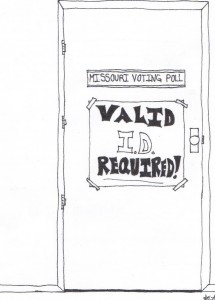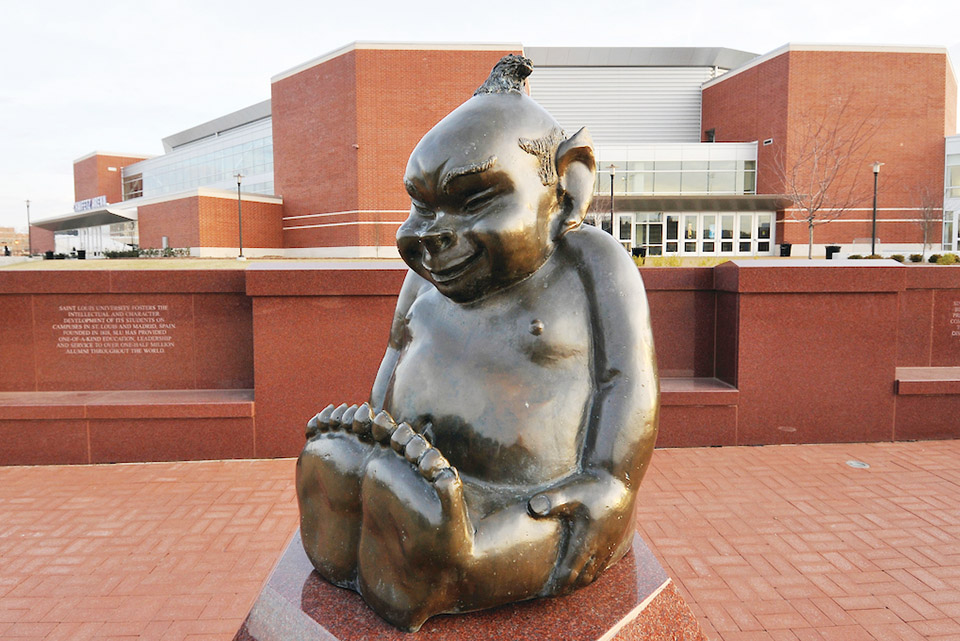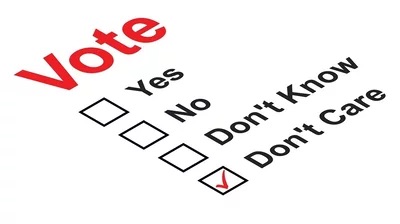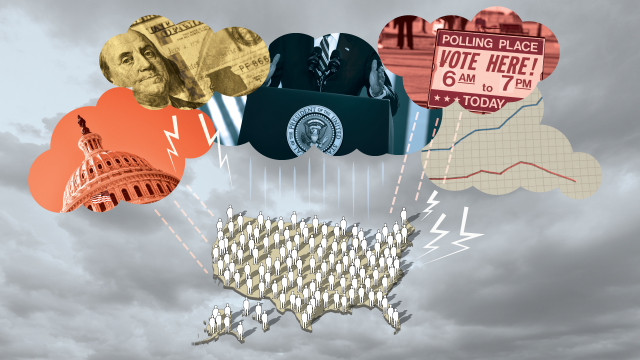The Missouri Legislature has officially resurrected the controversial Voter ID Bill. This bill, if passed, will require all who plan on voting in the state of Missouri to present a valid Missouri ID at the polls, regardless of their home state.
This bill was originally discussed in 2006 when it was found to be unconstitutional by state legislature.
Recently reintroduced to the House, Missouri residents are abuzz with what this means for the future of the Show-Me State.
While some, permanent Missouri residents claim that this will narrow the voting demographic to only those most affected by the elections, it seems that even more Missouri residents (both permanent and temporary) are prepared to fight the legislation for its exclusivity and its elusive access.
Saint Louis University is a conglomeration of students from across the United States, many of whom hold identification from their home state instead of that of Missouri.
In the past, student IDs from Missouri institutions of higher learning have been sufficient to vote in the state of Missouri and adhere to that ever-present “Vote or Die” message that bombards the 18-24 age group around election time.
If found to be constitutional, this bill will no longer allow student IDs to be sufficient at the polls.
If the bill is passed, chances are that a good majority of SLU students will not have the opportunity to vote in upcoming elections. Potentially, these students could head to a local DMV, equipped with their birth certificate, pay the fee for a Missouri ID and vote to their heart’s content, but the hassle of this process seems like a price that many won’t be willing and shouldn’t have to pay.
The irony of the ordeal is that young voters are often the most targeted audiences during election time, but here, the very governing body that encourages young adults to vote is considering diminishing many of their chances to do so. Missouri is endowed with multiple popular universities that attract thousands of students from across the country. If education is such a priority for the state, they should probably take into consideration the basic rights of those that they are so intent on educating.
We, as the next generation, are told that we are the future and we need to vote to become an active part of society, but then we’re excluded from doing so, finding ourselves at a politically helpless but seemingly apathetic dead end. Yes, it makes sense that those who will be most affected in the long-term should have the right to vote, but those who are affected in the short-term have a right to the benefits of law, too.
Not only does this affect college students, but it has the potential to affect the entire state for as long as the law stands. Traditionally, younger voters have tended to gravitate towards democratic ideologies. If this younger set of voters is deprived of their right to vote, the Democratic Party will see a serious decline in support coming from this great, yet slightly confused state. If this political decline had come about for voluntary reasons and shifting ideals, it would be a reasonable predicament, but because the change will come about out of ill-governed necessity, we might as well give up on democracy.
It might seem like a minute issue, but to those people who are deprived of a most basic American right, it’s far more pressing.
Don’t serve up the pressure of voting if you can’t deliver on your half of the bargain, Missouri legistlature.
Stephanie Mueller is a freshman in the College of Arts and Sciences.















Terry • Jun 1, 2011 at 10:54 pm
Another issue that many of the opponents of Voter I.D. tend to overlook is the fact that college students have the ability to vote by absentee ballot in their home states. That was the case when I was at SLU 20 years ago and continues to be the case now. Nobody is going to be disenfranchised as long as they make a minimal effort to secure an absentee ballot in a timely manner. As far as the laws of the state in which you attend school affecting you for the next four years, that is at least partially true. But if you are that concerned about your “temporary” state, I don’t think it is an undo burden to ask that you get an I.D. for that state. If you want to maintain your license in your “permanent” state, vote there since you apparently intend to return there when your time in school is done.
A loophole in the current system is that Secretaries of State, who are the officials responsible for voting oversight in their states, don’t generally talk to each other nor is there a sharing of their voting rolls to insure that students who are registered in multiple states are only allowed to vote in one. The Voter I.D. law won’t necessarily remove that loophole, but it will make it more of a burden for anyone wanting to exploit the loophole to do so.
I appreciate your desire to stay civically aware, but the results of passing the Voter I.D. law are not nearly as dire as you seem to believe.
Chris • Apr 6, 2011 at 4:23 pm
I was specifically told that my comment was not not allowed, through an email by the opinion editor? After I posted the second comment, both comments were approved.
I realize it takes time to post comments, but I continually checked back and it went from ‘Awaiting Moderation’ to just being gone. I was then told my comment was not allowed on the site. Not until I made it known that my comment was seemingly not allowed simply because it disagreed, and simply proved the article writer wrong, was my comment actually allowed.
Finally, I don’t expect my comment to get positive feedback on this website. These articles are obviously liberal, as I expect a majority their readers are.
Chris • Apr 5, 2011 at 9:40 pm
Thanks for not approving my comment because it disagreed with the writer. Great way to “start the ball rolling by posting a comment on this article”. Now everyone on facebook will hear about this article and about the sad website that puts those down who don’t agree with them. Thankfully, facebook still honors freedom of speech.
cwebb12 • Apr 6, 2011 at 3:28 pm
It was brought to my attention that you felt your comment was not approved due to the fact that it talked badly of the article. All of the comments are subject to approval, that is true, but unlike your claim, your comment was approved by our staff. It was posted just as you had typed it, but was delayed, like every comment, because we are all students and don’t have the ability to check the comments to approve every hour of the day.That being said, there is also a comment rating part that allows people to give a negative or positive rating to the comments. This uses a mathematical algorithm to calculate the percentage of negative view based on the amount of page views and how many negative ratings your comment gets. I am sorry that the community had selected to vote negatively toward your comments, but The University News does not remove comments just because they talk negatively of an article. You can still view the comment by going down to the bottom of the page and clicking the “Click here to view comment” text.
Once again I do apologize that it takes us a few hours to approve comments, but by no means does this mean we censor our comments.
Chris • Apr 5, 2011 at 5:01 pm
I’m sorry, but I have to point out a few things in this article that simply aren’t true.
“chances are that a good majority of SLU students will not have the opportunity to vote in upcoming elections”
This is a flat out lie. All students will have the exact same ‘opportunity’ to vote as they do now. Does requiring people to register to vote take away their opportunity? No, and neither does the proposed legislation.
“diminishing many of their chances to do so.”
Another lie. Does requiring someone to drive to a polling station diminish their ‘chance’ to do so? Maybe it diminishes the chances that they will, because they’re lazy or don’t care enough, but doesn’t diminish their chance, or ability.
“they should probably take into consideration the basic rights of those that they are so intent on educating.”
They are, Stephanie. If they were taking away students’ right to vote, this wouldn’t even be on the table.
“We, as the next generation, are told that we are the future and we need to vote to become an active part of society, but then we?re excluded from doing so”
Lie. Who is ‘excluded from doing so’? Nobody.
I could keep going, but you get the point. There were more voters registered than people over the age of 18 in some 14 or so counties last year; maybe there hasn’t been voter fraud yet, but our system isn’t good enough and being proactive is certainly the way to go.